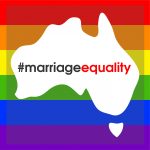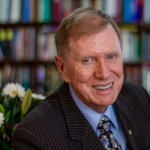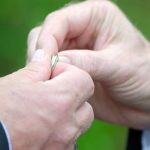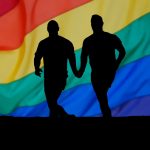Marriage Equality is Law, But the Religious Freedoms Debate Continues

It was an historic moment last Thursday, when the marriage equality bill passed through the lower house of parliament, enshrining same-sex marriage in the law. It brought an end to the Howard government’s ban on LGBTIQ marriages, enacted by a 2004 amendment to the Marriage Act.
Despite concerns the passage of the legislation could be delayed due to proposed amendments, all changes to the bill were voted down.
Indeed, for MPs that were concerned about the implications marriage equality could have for religious freedoms, the bill contained provisions to protect ministers of religion from acting contrary to their religious beliefs.
And for those parliamentarians who are still suggesting that religious liberties are under threat, prime minister Malcolm Turnbull has set up an expert panel to inquire into whether “the human right to religious freedom” is protected under Australian laws.
But, now that the right of LGBTIQ people to solemnise their partnerships has been affirmed, there are concerns as to what the proponents of religious freedoms are actually pushing for.
Deploying religious freedom fighters
During the postal vote, former prime minister and ardent No campaigner Tony Abbott paid a visit to New York City to speak on a panel hosted by the Alliance Defending Freedom (ADF) International: an organisation “defending religious freedom, the sanctity of life, and marriage and family.”
Whilst there, Abbott told the Catholic News Agency that despite the outcome of the postal vote, “the campaign for marriage in my country has mobilised thousands of new activists.”
This “network… could be deployed to defend western civilization more broadly and the Judeo-Christian ethic against all that’s been undermining it.” He further said that same-sex marriage will lead to people taking “offence to traditional teaching and anti-discrimination laws can… do the rest.”
And herein lies the problem. The defenders of religious freedoms want the rights of certain religious institutions upheld. Despite new laws to the contrary, they still want marriage to be defined as between a man and a woman. And these groups are also taking aim at laws that protect against discrimination.
The fall out in the States
A quick perusal of the ADF International website finds an anti-euthanasia laws article from Belgium, another about the rights of a Norwegian doctor to refuse to insert IUDs, and one regarding the right to artistic freedom for the US man who refused to make a cake for a same-sex marriage.
The case of Masterpiece Cakeshop versus Colorado Civil Rights Commission is currently before the US Supreme Court. In 2012, Jack Phillips, a Colorado cake shop owner, refused to bake a cake to celebrate the wedding of Charlie Craig and David Mullins.
Same-sex marriage is legal in Colorado today, but it wasn’t in 2012. So the men got married in Massachusetts, and held their reception in Colorado. And even though local laws forbid businesses to discriminate on the basis of sexuality, Phillips refused to make the cake due to his religious beliefs.
The couple took the case to the Colorado Civil Rights Commission and won. A subsequent appeal upheld the decision. Now, all eyes are upon the US Supreme Court, as Mr Phillips lodged an appeal claiming the decision violates his freedom of religion.
Hadi Khatib of the Muslim Public Affairs Council warned the Huffington Post that if the Supreme Court “enshrines into law the proactive right for people to use religious exemption to deny services to somebody based on their sexual orientation,” it will just be the beginning these discriminatory laws.
The Australian scene
Turnbull’s religious freedoms expert panel is headed by Philip Ruddock. He was the Howard government’s attorney general at the time the Marriage Act was amended to define marriage as the “voluntarily entered into union of a man and a woman to exclusion of all others.”
The rest of the announced panel includes Australian Human Rights Commission president Rosalind Croucher, Catholic priest and lawyer Frank Brennan, who was a Yes voter, as well as former federal court judge and current Bond University chancellor Annabelle Bennett.
However, there’s no representation from the LGBTIQ community, nor from minority religions, or from people of non-Anglo Australian backgrounds.
Preceding the establishment of the expert panel was the Human Rights Sub-Committee inquiry into the status of the human right to freedom of religion or belief. The inquiry’s interim report found that “legal protection of religious freedom in Australia is limited.”
It further outlined that the threat to religious freedoms are not due to the “dominance of one religion over others.” But rather it’s due to state anti-discrimination laws, “which do not allow for lawful differentiation of treatment by religious individuals and organisations.”
While it’s too early for the committee to make its recommendations in the interim report that was tabled on November 30, there’s much discussion within the document regarding the pros and cons of religious exemptions.
Freedom from liabilities
The interim report found that “while religious exemptions within non-discrimination laws provide some protection.” They “do not acknowledge the fundamental position that freedom of religion has in international human rights law.”
Article 18 of the International Covenant on Civil and Political Rights (ICCPR) provides that “everyone shall have the right to freedom of thought, conscience and religion.”
Liberal MP Kevin Andrews is the chair of the Human Rights Subcommittee. He’s pointed out that while the protection of the right to religion has not been enshrined in Australian law, the right against discrimination, contained in article 26 of the ICCPR, has been.
Mr Andrews also backed the comments of Liberal MP Andrew Hastie, when he warned that the religious protections within the marriage equality bill were inadequate. “Will people, churches, schools, charitable organisations and businesses be protected if they hold to the common view of marriage?” Mr Hastie asked.
It seems that as the religious freedoms inquiry is yet to table its final report, and the expert panel review is just underway, there’s a very real danger that conservative forces could move to legislative for religious exemptions.
And from there who knows what other freedoms could trump protections against discrimination… section 18 C of the Racial Discrimination Act anyone.








